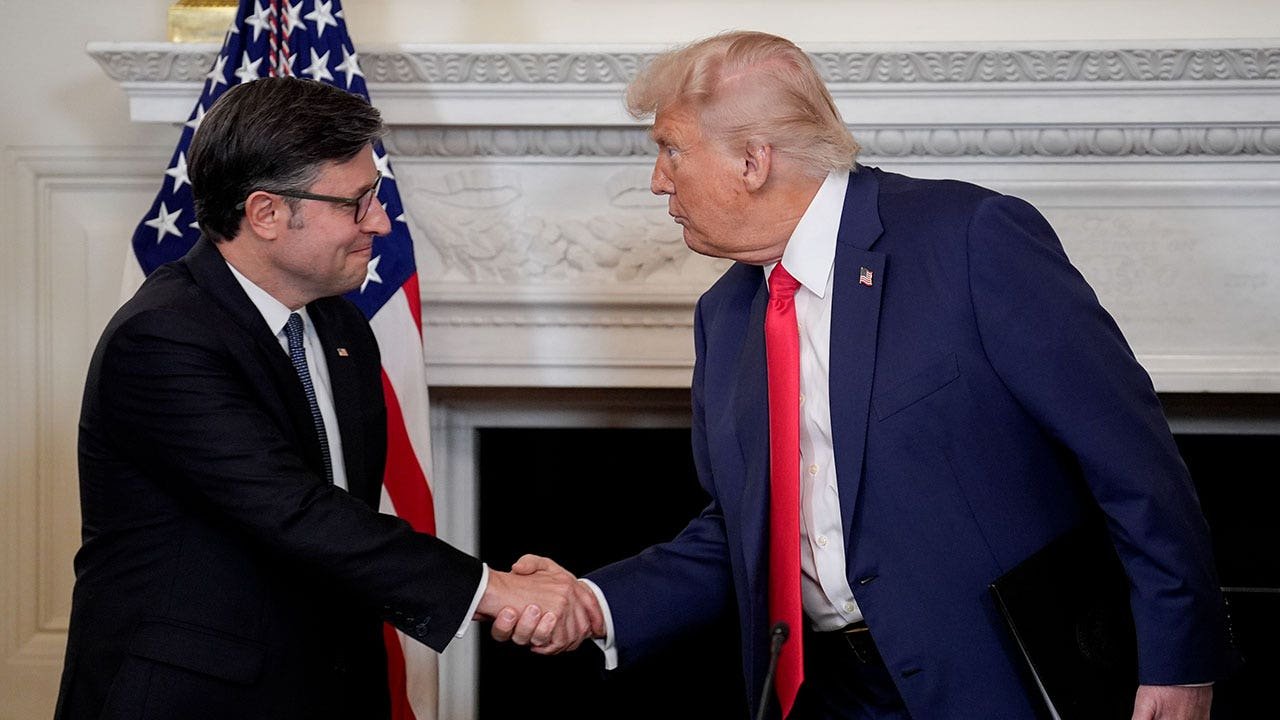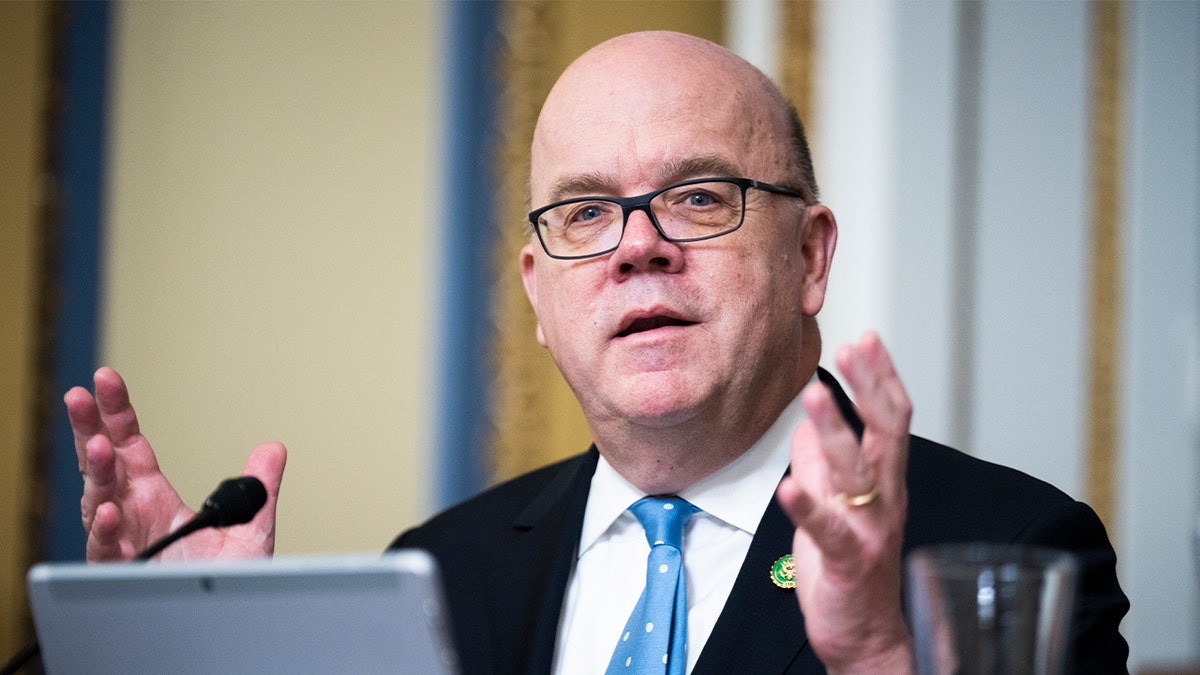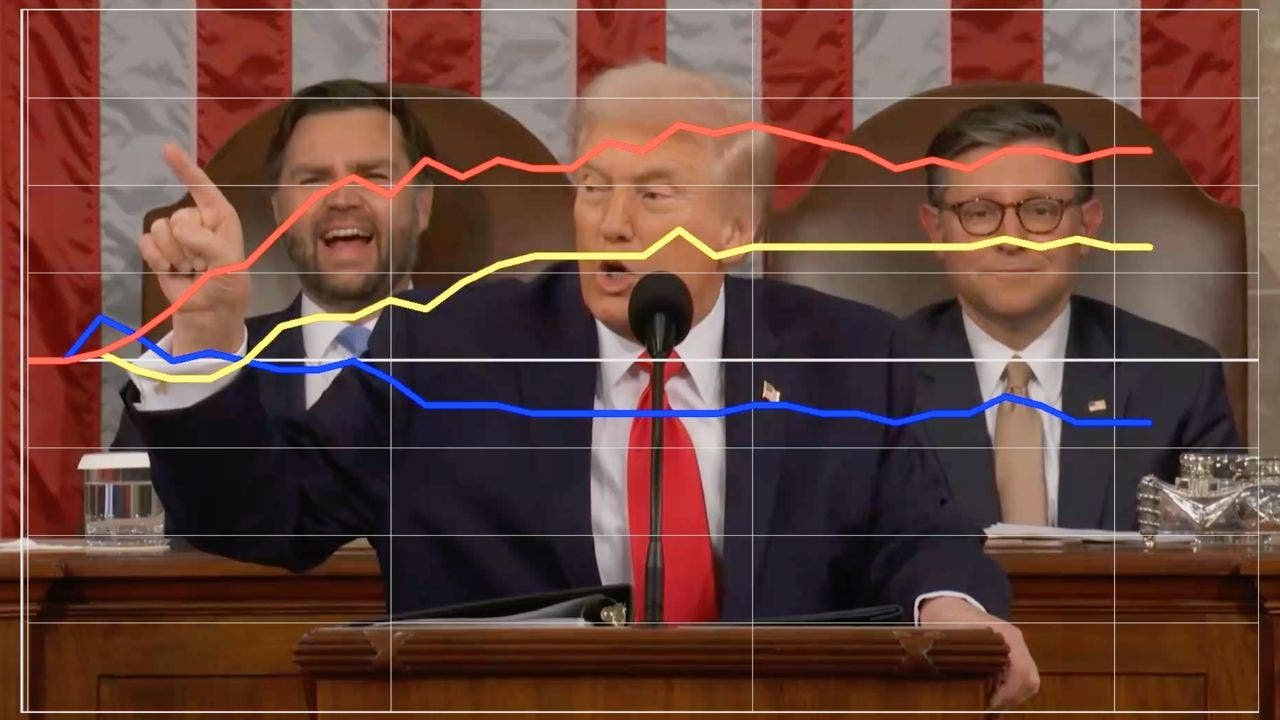INTERNACIONAL
Congress sends $9B spending cuts package to Trump’s desk after late-night House vote

NEWYou can now listen to Fox News articles!
Congress is officially sending a package detailing $9 billion in spending cuts to President Donald Trump’s desk, minutes after midnight on Friday.
The bill, called a «rescissions package,» was approved by the House of Representatives in a late-night 216 to 213 vote after intense debate between Republicans and Democrats. Just two Republicans, Reps. Brian Fitzpatrick, R-Pa., and Mike Turner, R-Ohio, voted in opposition.
Friday was also the deadline for passing the legislation, otherwise the White House would be forced to re-obligate those funds as planned.
It’s a victory for House Speaker Mike Johnson, R-La., but a mostly symbolic one – the spending cuts bill was largely seen by Trump allies as a test run of a fiscal claw-back process not used in more than two decades.
FAR-LEFT FIREBRAND SAYS SHE ‘NEVER HAD A CONCERN’ ABOUT BIDEN’S MENTAL STATE AS HOUSE PROBE HEATS UP
House Speaker Mike Johnson ushered through President Donald Trump’s spending cuts (Yuri Gripas/Abaca/Bloomberg via Getty Images)
«This bill tonight is part of continuing that trend of getting spending under control. Does it answer all the problems? No. $9 billion, I would say is a good start,» House Majority Leader Steve Scalise, R-La., said during debate on the bill.
When signed by Trump, it will block $8 billion in funding to the U.S. Agency for International Development (USAID) and $1 billion to the Corporation for Public Broadcasting for the remainder of the fiscal year. The dollars had been allocated by Congress for the duration of fiscal year 2025.
Republicans celebrated it as a victory for cutting off the flow of U.S. taxpayer dollars to what they called «woke» initiatives abroad, while Democrats accused the right of gutting critical foreign aid.
Rescissions packages are a way for the president to have input in Congress’ yearly appropriations process. The White House sends a proposal to block some congressionally obligated funds, which lawmakers have 45 days to get through the House and Senate.
Republicans have also been able to sideline Democrats so far, with the rescissions process lowering the Senate’s threshold for passage from 60 votes to 51.
The last time a rescissions package was signed into law was 1999.
Consideration of the bill began with a House Rules Committee hearing at 6 p.m. on Thursday evening.

Ranking member Rep. Jim McGovern attempted to force multiple voted related to Jeffrey Epstein (Tom Williams)
Democrats attempted multiple times throughout the process to weaponize the ongoing inter-GOP fallout over the Jeffrey Epstein case, both in the House Rules Committee and on the chamber floor during debate on the bill.
Multiple calls were made for votes to force the release of the so-called Epstein «files.»
«If every Republican votes to block our attempt to release the records, they are telling Epstein’s victims, you don’t matter as much as our political convenience. And that should disgust every single one of us,» said Rep. Jim McGovern, D-Mass.
Far-right GOP figures are demanding accountability, while Trump has called on his base to move on after the Department of Justice (DOJ) signaled the case was closed.
Initial plans to begin advancing the bill earlier in the day were quickly scuttled, with Republicans on the committee being concerned about being put into a difficult position with potential Epstein votes.
In the end, a compromise led to the House Rules Committee advancing a separate nonbinding measure dealing with Epstein transparency, on a parallel track to the rescissions bill.
THOM TILLIS ANNOUNCES RETIREMENT FROM SENATE AFTER CLASH WITH TRUMP
CLICK HERE TO GET THE FOX NEWS APP
«All the credible evidence should come out. I’ve been very clear with members of the House Rules Committee. Republicans have been taking the incoming criticism because they voted to stop the Democrats’ politicization of this, and they’re trying to stick to their job and move their procedural rules to the floor so we can do our work and get the rescissions done for the American people,» Johnson told reporters during negotiations earlier in the day.
Democrats nevertheless pressed on, mentioning Epstein multiple times on the House floor. McGovern even briefly led a chant of «release the files» when closing debate on the bill.
Republicans, in turn, accused Democrats of hypocrisy.
«Interesting how they talk about Jeffrey Epstein, because for four years, Mr. Speaker, President Joe Biden had those files, and not a single Democrat that you’re hearing tonight tried to get those files released,» House Majority Leader Steve Scalise, R-La., said at one point during the House floor debate.
The House initially voted to advance a $9.4 billion rescissions package, but it was trimmed somewhat in the Senate after some senators had concerns about cutting funding for HIV/AIDS prevention research in Africa.
Trump is expected to sign the bill on Friday.
INTERNACIONAL
Voters react as Trump calls Dems ‘crazy’ for not applauding ban on secret teen gender transitions

NEWYou can now listen to Fox News articles!
President Donald Trump’s decision to rip Democrats as «crazy» during his State of the Union address on Tuesday — after they remained seated while he demanded a ban on socially transitioning minors without parental consent — drew sharply divided reactions from a live panel of voters.
The panel, assembled by polling group Maslansky & Partners, included 29 Democrats, 30 Independents and 40 Republicans. Their real-time reactions were displayed as colored lines on a graph, with higher values representing positive reactions and lower values indicating negative ones.
«But surely we can all agree no state can be allowed to rip children from their parents’ arms and transition them to a new gender against the parents’ will,» Trump said. «Who would believe that?… We must ban it, and we must ban it immediately.»
As Trump delivered the remarks, the Republican line, shown in red, climbed sharply into positive territory. Independents, represented in yellow, also ticked upward, while Democrats, shown in blue, trended downward into negative territory.
President Donald Trump speaks during his State of the Union address as a live reaction panel assembled by Maslansky & Partners tracks voter responses to his remarks on banning school gender transitions without parental consent. Republicans are shown in red, Independents in yellow and Democrats in blue. (Fox News)
The comments drew applause from Republicans in the chamber, but the president became incensed when he realized that Democrats refused to stand.
«Look, nobody stands up,» Trump said.
«These people are crazy. I’m telling you. They’re crazy,» Trump said, pointing his finger at Democratic senators and House members who remained seated.
Republican reactions stayed elevated during the remarks, while Democratic responses remained negative and independent voters held relatively steady.

Sage Blair and her mother, Michelle Blair, stand in the gallery during President Donald Trump’s State of the Union address after he highlighted her case involving alleged school gender transition policies. (Pool)
Trump made the remarks as he called on Sage Blair, a Virginia teenager whose family filed a 2023 lawsuit alleging that Appomattox County High School staff socially transitioned her without parental knowledge.
According to a lawsuit filed by her family, Blair began identifying as male at school, where staff used male names and pronouns and allowed her to use male facilities without informing her parents.
WATCH: Trump highlights teen whose family says school hid her gender transition during State of the Union
TRUMP TAKES DIRECT SOTU SWIPE AT DEMOCRATS OVER TAXES: ‘TO HURT THE PEOPLE’
The family alleges the situation escalated after Blair ran away from home and later became a victim of sex trafficking, with the lawsuit alleging she was kidnapped and raped in multiple states.
Highlighting the case during his address, Trump said Blair was 14 when school officials sought to socially transition her «to a new gender,» treating her as a boy and hiding it from her parents.
«But today, all of that is behind them because Sage is a proud and wonderful young woman with a full-ride scholarship to Liberty University. Sage and Michelle, please stand up,» Trump said as Republicans in the chamber cheered.
«Thank you for your great bravery,» he added.
The gender policy segment generated some of the strongest reactions of the night from the panel.
CLICK HERE TO DOWNLOAD THE FOX NEWS APP

President Donald Trump demanded a ban on schools socially transitioning minors without parental consent at Tuesday’s State of the Union. (Kenny Holston-Pool/Getty Images)
Among supporters, several comments focused on protecting children and parental involvement, including: «Protect children,» and «Parents should be informed.»
Opponents pushed back on the scope of the proposal, writing comments such as: «Every case is unique,» and «A total ban is not good.»
The issue appeared to trigger deeply personal reactions on both sides.
politics,donald trump,state of the union,congress,woke
INTERNACIONAL
El primer ministro de India, Narendra Modi, inició su segunda visita oficial a Israel

El primer ministro de la India, Narendra Modi, llegó a Israel el miércoles para una visita de dos días destinada a profundizar los lazos con un socio comercial y de defensa clave, un viaje que ha generado críticas en el país.
Es la segunda visita de Modi a Israel como primer ministro.
Tiene previsto reunirse con su homólogo Benjamin Netanyahu y con el presidente Isaac Herzog.
“Nuestras naciones comparten una asociación estratégica sólida y multifacética”, dijo Modi en una declaración antes de salir de Nueva Delhi, y agregó que se dirigirá a la Knesset, el parlamento de Israel, más tarde el jueves.
“Los lazos se han fortalecido significativamente en los últimos años”.
Nueva Delhi ha ampliado constantemente la cooperación con Israel en los sectores de defensa, agricultura, tecnología y ciberseguridad, al tiempo que equilibra sus intereses diplomáticos en Oriente Medio.
El lunes se iniciaron en Nueva Delhi las conversaciones para un Acuerdo de Libre Comercio (TLC) entre India e Israel, dijo el gobierno de India en un comunicado, señalando que el comercio de mercancías alcanzó los 3.620 millones de dólares en 2024-2025.
Modi dijo que mantendría conversaciones con Netanyahu para “discutir formas de fortalecer la cooperación”.
Las relaciones diplomáticas plenas entre ambos países se establecieron en 1992. Los lazos se profundizaron después de que el líder nacionalista hindú Modi asumiera el cargo en 2014.
Modi visitó Israel por primera vez como primer ministro en 2017, antes de que Netanyahu hiciera una visita recíproca a la India el año siguiente.
Ambos líderes de derecha se han llamado mutuamente “amigos”.
En septiembre de 2023, se dieron a conocer en Nueva Delhi grandes planes para un Corredor Económico India-Medio Oriente-Europa, que conectaría ferrocarriles, puertos, electricidad, redes de datos y oleoductos, incluso a través de Arabia Saudita e Israel.
Esos planes se vieron frustrados por el ataque de Hamas del 7 de octubre contra Israel, que respondió con una guerra devastadora en la Franja de Gaza.
“Lo que ocurrió el 7 de octubre fue recibido en la India con conmoción y horror, y es por eso que el apoyo a Israel fue rápido, instantáneo y enorme”, dijo Ashok Malik, director de la firma de asesoría estratégica The Asia Group, con sede en Nueva Delhi.
Los vínculos entre India e Israel, que Modi está “impulsando con esta visita”, no surgen únicamente de una alineación estratégica en cuestiones como el terrorismo, añadió.
“Israel tiene mucho que aportar en materia de innovación tecnológica, incluyendo agricultura, tecnología, alianzas económicas y, por supuesto, defensa… Esto es completamente independiente de la cuestión palestina”, afirmó Malik.
Meses después de su visita a Israel en 2017, Modi viajó a Ramallah, sede de la Autoridad Palestina.
Sin embargo, su visita actual ha suscitado críticas en su país.
Priyanka Gandhi, figura destacada del partido del Congreso y hermana del líder de la oposición Rahul, publicó el miércoles en las redes sociales que esperaba que Modi mencionara el asesinato de “miles de hombres, mujeres y niños inocentes en Gaza” cuando se dirigiera al parlamento de Israel.
India, la nación más poblada del mundo con 1.400 millones de habitantes, es mayoritariamente hindú, pero se estima que 220 millones de indios son musulmanes.
Uno de los conglomerados más grandes de la India, Adani Group, opera el puerto israelí de Haifa, mientras que la tecnología de drones militares israelíes jugó un papel fundamental durante el enfrentamiento de mayo de 2025 entre la India y Pakistán.
Al mismo tiempo, India mantiene fuertes relaciones con los países del Golfo y Teherán, incluido el desarrollo del puerto iraní de Chabahar, una puerta de entrada comercial a Afganistán, donde Nueva Delhi ha construido una relación con las autoridades talibanes.
(con información de AFP)
International,Relations,Diplomacy / Foreign Policy,Middle East
INTERNACIONAL
Louvre Museum director resigns following $102M theft of crown jewels

NEWYou can now listen to Fox News articles!
The director of the Louvre Museum in Paris has stepped down, months after thieves stole $102 million in crown jewels in a lightning-fast weekend robbery.
Laurence des Cars presented French President Emmanuel Macron with her resignation, which Macron accepted, according to a statement from the presidential office.
It said Macron praised her decision as «an act of responsibility at a time when the world’s largest museum needs calm and a strong new impetus to carry out major projects involving security upgrades, modernization» and other projects.
Macron thanked des Cars for «her work and commitment,» and said he wanted to give her a new mission focused on cooperation among major museums, the statement said, without saying if she had accepted.
Laurence des Cars, director of Le Louvre Museum, poses before a hearing at the Culture commission of the Senate, three days after historic jewels were stolen in a daring daylight heist, Oct. 22, 2025, in Paris. (AP Photo/Emma Da Silva, File)
Des Cars has remained under fire in the wake of the heist, which many critics have labeled a stunning embarrassment.
Thieves took less than eight minutes in October to steal priceless crown jewels at the world’s most visited museum in broad daylight.

People queue outside the Louvre Museum, in Paris, France, Friday, Feb. 13, 2026. (AP Photo/Michel Euler)
WORLD’S MOST FAMOUS MUSEUM SLAMS DOORS TO VISITORS AS EMPLOYEE REVOLT CONTINUES
The thieves left behind Eugénie’s emerald-encrusted crown, which is set with over 1,300 diamonds, along their escape route outside the museum. The crown was damaged but deemed recoverable.

A police car parks in the courtyard of the Louvre Museum, one week after the robbery, on Oct. 26, 2025, in Paris. (Thomas Padilla, File/AP Photo)
CLICK HERE TO DOWNLOAD THE FOX NEWS APP
Authorities have arrested several suspects in that case, but the seven other priceless treasures, including Eugenie’s diamond-studded tiara, necklaces, earrings and brooches, remain missing.
The Associated Press contributed to this report.
france,crime world,crime,europe,arts,world

 POLITICA2 días ago
POLITICA2 días agoDaiana Fernández Molero defendió la reforma laboral: “Va a haber mayor creación de empleo porque va a ser más fácil contratar en blanco”

 POLITICA2 días ago
POLITICA2 días ago“Nos hacemos cargo”: Patricia Bullrich admitió un error del Gobierno en la inclusión del artículo de las licencias médicas

 ECONOMIA2 días ago
ECONOMIA2 días agoEl salario pretendido por los argentinos volvió a caer en enero: cuánto piden por cada puesto

















